Exploring the past for a more equitable future
Inaugural Craft Lecture examines ‘Capital, Slavery and Corporate Responsibility’
Bayes Business School held the inaugural Craft Lecture on Wednesday 18th October. Entitled ‘Capital, Slavery and Corporate Responsibility’, the lecture was hosted by Malla Pratt, Director for Racial Equity and Inclusion at Bayes, and was introduced by Dr Paul Lashmar, Reader in Journalism at City, University of London. The lecture was delivered by Alan Smith, First Church Estates Commissioner at The Church of England.
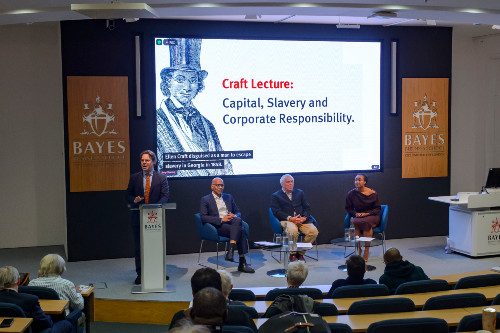
Professor André Spicer (left), Dean of Bayes, welcomes everyone to the inaugural Craft Lecture
Changing more than a name
In his welcoming remarks, Professor André Spicer, Dean of Bayes, spoke about how the Craft Lecture Series has been established as part of the School’s commitment to changing more than a name. In particular, Professor Spicer said how Bayes wants to use it as a platform to discuss important topics related to inequality and social justice, and how they relate to business.
Professor Spicer handed over to Malla Pratt who spoke about the origins of the Craft Lecture Series and the vital initiatives that have been going on in the School as it addresses its past and the consequences of colonialism, and engages in initiatives towards a sustainable and more equitable future.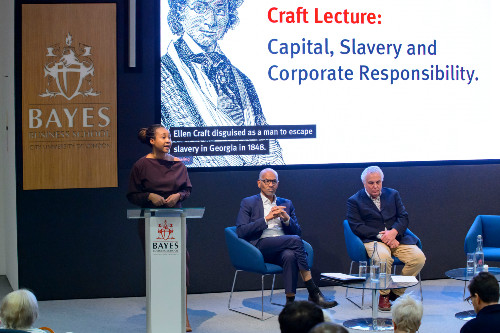
Malla Pratt (left), Director for Racial Equity and Inclusion at Bayes, elaborates on the origins of the Craft Lecture Series
“In 2020, there was increased awareness of the links that Sir John Cass had with the slave trade, and that made us as stakeholders reflect on how this link was inconsistent with our values as a business school,” said Malla.
This led to the name change in September 2021 from Cass Business School to Bayes. As part of this process, the School also decided to embark on initiatives to strengthen its commitment to fostering and driving a diverse, equitable and inclusive (DEI) culture. This includes the Racial Equity and Inclusion Network (REIN), the Inclusive Teamwork workshop for master’s and undergraduate students, DEI staff workshops, the launch of the UG Black Scholarship and the Craft Lecture Series.
“What we do on the inside reflects what we do on the outside, and tonight, I will encourage you to reflect on how understanding our past empowers corporations and institutions to make better decisions in the present and future for a more equal society,” added Malla, before handing over to Dr Lashmar.
Investigating the slave trade
“Foremost I am a journalist, and this story needs to be told,” said Dr Lashmar as he went on to discuss where Britain is now in terms of culpability for slavery in its former Empire.
As an investigative journalist, Dr Lashmar has recently been writing about slavery and reparations for The Observer and The Conversation, and he has also written an unauthorised history of the Drax family of Dorset, who still own the former slave plantation at Drax Hall in Barbados.
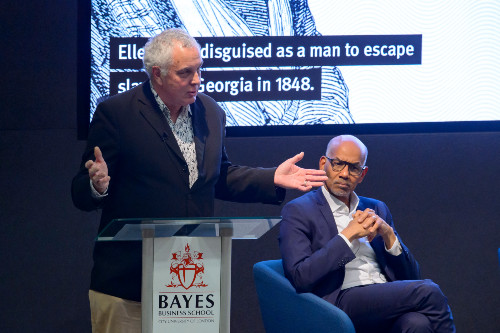 Dr Paul Lashmar (left), Reader in Journalism at City, talks about where Britain is now in terms of culpability for slavery in its former Empire
Dr Paul Lashmar (left), Reader in Journalism at City, talks about where Britain is now in terms of culpability for slavery in its former Empire
Speaking about how rarely slavery was mentioned as a child growing up in East London, Dr Lashmar went on to talk about the struggle to discuss the topic and the issues he had getting programmes commissioned on the subject in the late 90s and mid-2000s. However, Black Lives Matter signalled a sea change in sentiment. While driving back to his home in West Dorset, he was listening to the radio and the news about the protests in Bristol when he passed the Drax estate. This led to thoughts about how Richard Drax, the MP for South Dorset, might be in a unique position to bring some recognition to those affected by the legacies of slavery, and this subsequently led to the book.
“Today, I feel the record of Empire should be set straight, so the new generation does not grow up as misled as mine,” said Dr Lashmar. “If Britain is ever going to re-establish its moral leadership role in the world again as an outward-looking, democratic, and progressive nation, it needs to come to terms with its past.”
Learning from the past to build a better future
In delivering the inaugural Craft Lecture, Alan spoke about the Church Commissioners for England’s links with the slave trade – the findings, reflections, and response to which were published in a report in early 2023. He discussed the motivations, approach, and lessons learned and why, as a matter of responsibility and good governance, it is an issue for boards of corporations to address today.
The Church Commissioners is the in-perpetuity endowment fund established in 1704 to support the mission of the Church of England in England. Its establishment coincided with an influx of capital that flooded into London in the 1700s as a result of the transatlantic chattel slave trade. Today, the Church Commissioners manage the Church of England's £10.3bn endowment fund.
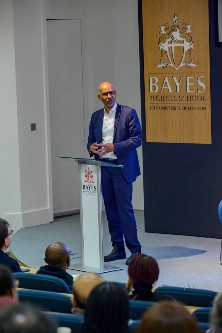 Alan Smith delivers the inaugural Craft Lecture
Alan Smith delivers the inaugural Craft Lecture
A Bayes alumnus and former banker at HSBC before his switch to the Church Commissioners in 2021, Alan spoke about the four-year journey to address this history, highlighting how the Church Commissioners used its accountants to employ a forensic financial methodology to interrogate its historical ledgers to establish the findings in the report. Alan said that a 14-person independent panel of experts has been appointed to advise on the actions to be taken.
To finish, Alan quoted James Baldwin, who wrote: “Not everything that is faced can be changed, but nothing can be changed until it is faced”, adding that “deepening our understanding of the history of transatlantic chattel slavery will help corporations and help us all change the world and build a better future that we all want.”
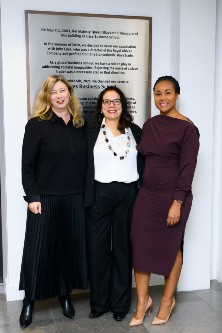
(From left to right) Professor Caroline Wiertz, Deputy Dean of Bayes, Professor Lilian de Menezes, Associate Dean for Diversity, Equity and Inclusion at Bayes, and Malla Pratt, Director for Racial Equity and Inclusion at Bayes, stand by the recently unveiled Bayes Business School plaque
Read Alan Smith's inaugural Craft Lecture on 'Capital, Slavery and Corporate Responsibility'
